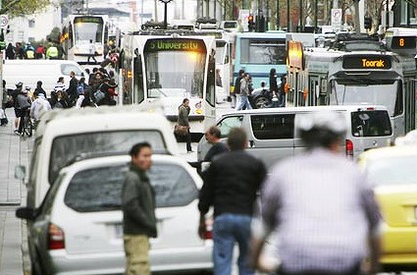'Future Mobility Sensing'—better travel data for a smarter city

A new smartphone application is currently being tested by the University of Melbourne to gather accurate travel and activity data.
The Future Mobility Sensing (FMS) app developed by Singapore-MIT Alliance for Research and Technology (SMART) is expected to provide more detailed travel information than traditional paper-based diaries.
Professor Stephan Winter from the Melbourne School of Engineering said transport planners rely on surveys to understand how, where and when travel is made across the city.
In Melbourne, data is provided by the Victorian Integrated Survey of Travel and Activity (VISTA).
"Completion of a travel diary can be a burden on respondents. Information is returned for a single day of travel only, making it difficult to answer questions around travel habits and travel variability," he said.
Some trips may also be omitted or simply overlooked by respondents, giving researchers a less than accurate picture. By collecting information that describes the broad transport characteristics of the city's residents, it will help to inform and monitor transport policies.
The app simplifies data collection by automatically tracing user movements across the day.
By tapping into various smartphone sensors, such as GPS and accelerometer technology, detailed descriptions of routes can be constructed. This provides a substantial benefit over traditional surveys, which are limited to origin and destination information only.
The app also predicts the method of travel for any trip, based on the travel speed and path taken. At the end of each day, users are asked to review the travel data collected by the app, and confirm the activities undertaken at each destination.
Recognising the growing tension between collection of large datasets and personal privacy, all data is securely stored using servers of the NeCTAR national research cloud and de-identified prior to analysis.
The project is being led by Professor Stephan Winter from the Melbourne School of Engineering. Detailing the advantages of the Future Mobility Sensing app, Professor Winter is keen to highlight the improved level of information that could be made to decision-makers.
"Through tools like the FMS, we will obtain fine-grained data on the movements of people through our urban spaces. From information about how commuters change their travel behaviour across the week, through to knowledge of preferred pedestrian routes in accessing local shops, transport planners can begin to understand how people really engage with their local areas," Professor Winter said.
He also emphasised the need for better communication between decision makers and residents.
"Through tools such as this, there will be opportunities to link travel data with people's actual experiences. Melburnians are passionate about their transport system; we want to look for ways to capture the joys and frustrations of travelling around this great city."
Provided by University of Melbourne



















